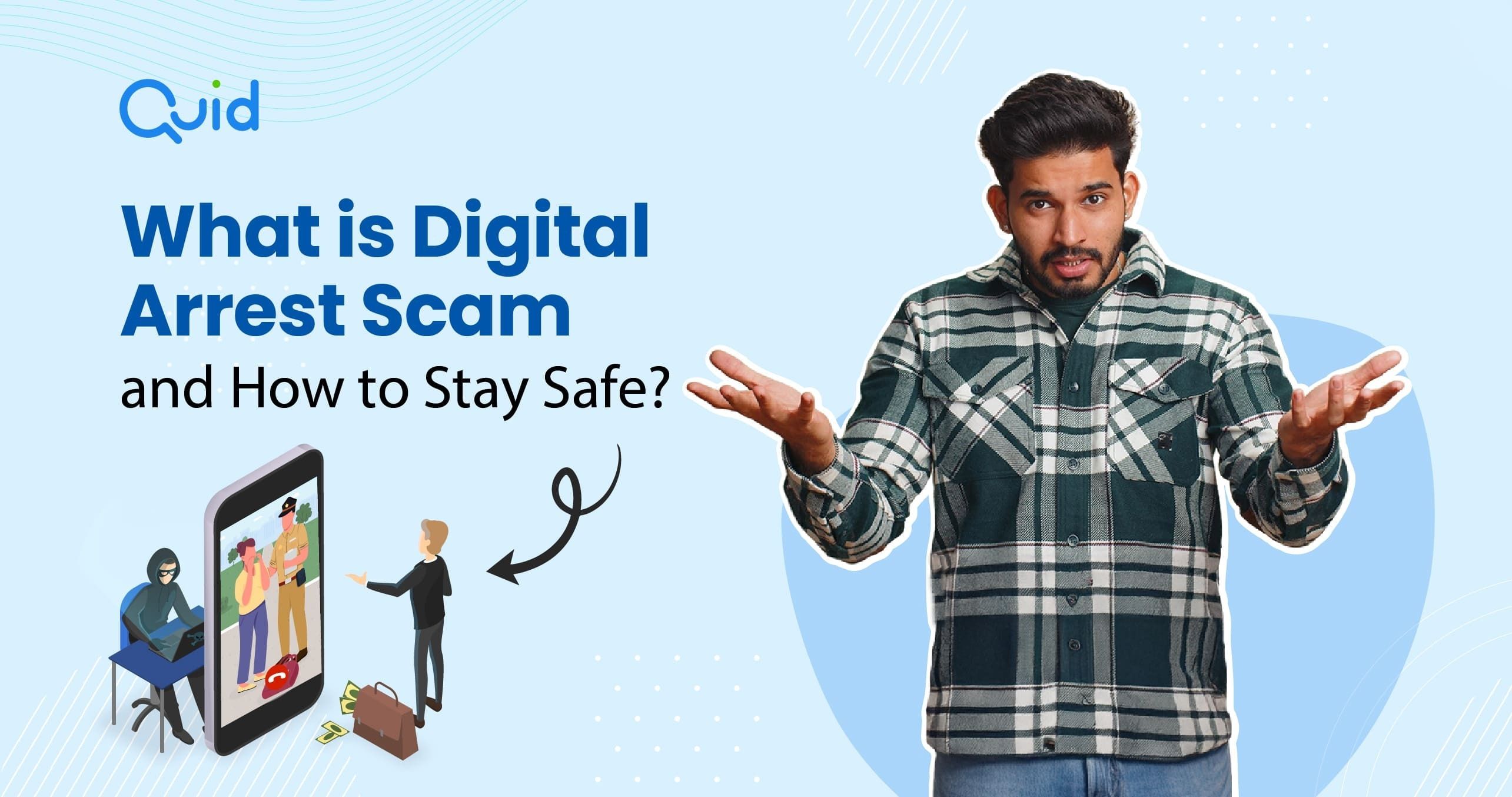
Cyber crimes today have become increasingly common and sophisticated. Scammers are finding new ways to defraud innocents and extort money. One such cyber fraud that is rising at an alarming rate is digital arrest scams. What makes the scam more worrying is its reach. From an average citizen to a high-profile employee, anyone can become the target.
It's a serious concern in India, to the point that even the Prime Minister issued a warning to the public, urging them to report such incidents to the cyber crime helpline. In this blog, we will cover everything you need to know about digital arrest scams, how they work, and how to protect yourself from such fraud.
Digital arrest scams are online scams where fraudsters impersonate law enforcement or government authorities through video calls, emails, or text messages. They claim that there is an arrest warrant against you, or that you are under investigation for alleged involvement in illegal activities. They demand immediate payment or sensitive information to resolve this issue, often threatening arrest if you don’t comply.
Cybercriminals involved in scams like digital arrest play with people’s fear of legal trouble and rely on the victim’s trust in authority figures. These scams use spoofed phone numbers, emails, and fake websites mimicking legitimate institutions to lure the victims into believing them. These scammers often isolate the victim and threaten them with fabricated consequences if they don’t follow their orders.
The digital arrest scam is a carefully strategised act that plays on victims’ fear and confusion. Here’s how it usually unfolds:
A digital arrest scam often begins with a simple phone call or message appearing to be from a bank, telecom provider, or courier service. The message warns the recipient about some suspicious activity linked to their accounts and its legal consequences. Following this, the victim is directed to a ‘representative’ who poses as a government official, such as police, CBI agents, or income tax officials.
On the call, the scammer escalates the issue by using the victim’s personal information to make it credible. They accuse the victim of being involved in serious crimes, such as drug smuggling or money laundering, to create anxiety. They sometimes switch to video calls to make the interaction more realistic. During the video calls, scammers may appear in uniforms and set up fake backgrounds to add authenticity.
When the victim is panicked, the scammer introduces a ‘solution’ to the issue. They demand immediate payment as a ‘fine’ to prevent arrest or other legal action. The transactions are done through untraceable channels like cryptocurrency or prepaid cards. The victim is under surveillance throughout the process to prevent them from seeking advice from others, pushing them to comply without any option.
Also Read: Call Merging Scam: What it is and How to Stay Safe
The most important way to protect yourself from getting scammed is to be aware and vigilant against such crimes. Here are some tips to save you from getting scammed:
Scammers create a sense of urgency to pressure victims into making hasty decisions. Police authorities do not issue arrest warrants or demand money over the phone or via video calls. If you receive a scam call, remain composed and do not act impulsively. Take time to think and act wisely.
If someone claims to be a government official, never trust the call blindly. Cross-check the identity of the calls or messages. Connect the relevant agency directly using the information on the official websites to confirm their claims. Remember, government organisations rarely ask for payments or confidential data on calls.
Avoid sharing personal or financial data over unsolicited calls, emails, messages, or even online. Use two-factor authentication for important accounts and stay alert to phishing attempts. If you doubt that sensitive documents were compromised, change passwords and inform your bank at the earliest.
Be sceptical when you are asked to make quick payments or share details on calls or emails. Scammers create a tense situation that leads you to make wrong decisions. Pay attention to inconsistencies in their conversations, or poor grammar, and spelling mistakes in their messages or emails.
If you lost money to a digital arrest scam, report it to the National Cyber Crime Reporting Portal at 1930 or visit cybercrime.gov.in. Inform your bank immediately so they can freeze your account and stop further transactions. Keep all the evidence, such as call logs, transaction details, or messages, for further legal procedures.
Stay updated on common digital scams and know about their tactics. Follow digital arrest news or cybersecurity blogs to learn about emerging scams. Share your knowledge with family and friends, especially those lacking digital literacy. Awareness is the first step against falling victim to scams.
Digital arrest scams are a growing threat, exploiting fear and misinformation to target the ignorant public. The best way to keep yourself safe is through awareness and vigilance. Follow genuine news sources to stay updated on digital scams and identify them. Trust your instincts, always verify the authenticity of claims, and don’t hesitate to report scams to the legal authorities.
Stay informed, stay safe, and educate others. For a secure digital presence, depend on trusted platforms like Quid and stay updated with reliable information on new scams.
Get credit at first sight and be closer to your goals.
Download Now